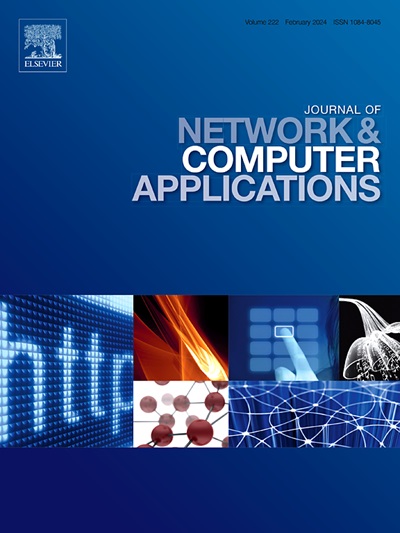Predictive safe delivery with machine learning and digital twins collaboration for decentralized crowdsourced systems
IF 8
2区 计算机科学
Q1 COMPUTER SCIENCE, HARDWARE & ARCHITECTURE
引用次数: 0
Abstract
Crowdsourced last-mile delivery leverages workers willing to complete delivery tasks posted by requesters for incentives through dedicated platforms. While this is effective and affordable, crowdsourced delivery faces significant challenges, including the workforce’s uncertain availability and capability to deliver packages safely, inadequate package monitoring, and a lack of trust among the participants. These issues have become increasingly pronounced due to the rapid growth of e-commerce, where last-mile delivery constitutes a substantial portion of overall delivery costs and delays. Existing centralized works attempt to tackle the uncertainty of workforce availability and capability by analyzing worker behavior or predicting the fulfillment success in the allocation mechanism. On the other hand, decentralized solutions introduce blockchain-based platforms for transparent and secure interaction and transaction recording to tackle the challenge of lack of trust. These existing approaches, however, overlook a critical aspect of crowdsourced delivery, where successful task completion relies not only on worker commitment but also on delivered package status. In response, this work proposes a comprehensive framework leveraging machine learning, blockchain, and digital twins for package safe and transparent delivery. The proposed approach utilizes machine learning models to predict the delivery success of packages off-chain secured using IPFS and smart contracts events. Subsequently, a task allocation mechanism hosted on a blockchain integrates the projected delivery success with the Quality of Service (QoS) metric to assign tasks to workers with an increased likelihood of successful completion. Package digital twins are designed and employed to monitor packages in real-time, providing transparent feedback on package status and delivery. The trained models demonstrate an average accuracy of 96% and an F1-score of 94%. Evaluation with real-world data revealed substantial enhancements: task success rates improved by 48%, quality of service by 41%, worker reputation by 26%, and package delivery quality by 16%.
为分散众包系统提供机器学习和数字孪生协作的预测性安全交付
众包的最后一英里配送利用工人愿意完成交付任务的请求者发布的奖励通过专门的平台。虽然这是有效和负担得起的,但众包交付面临着重大挑战,包括劳动力的不确定可用性和安全交付包裹的能力,包裹监控不足以及参与者之间缺乏信任。由于电子商务的快速发展,这些问题变得越来越明显,在电子商务中,最后一英里的交付构成了总体交付成本和延迟的很大一部分。现有的集中式工作试图通过分析工人行为或预测分配机制中的实现成功来解决劳动力可用性和能力的不确定性。另一方面,去中心化的解决方案引入了基于区块链的平台,用于透明和安全的交互和交易记录,以解决缺乏信任的挑战。然而,这些现有的方法忽略了众包交付的一个关键方面,即成功完成任务不仅依赖于工人的承诺,还依赖于交付的包裹状态。作为回应,本工作提出了一个综合框架,利用机器学习、区块链和数字孪生来实现包裹安全和透明的交付。所提出的方法利用机器学习模型来预测使用IPFS和智能合约事件保护的链下包裹的交付成功。随后,托管在区块链上的任务分配机制将预计的交付成功与服务质量(QoS)度量集成在一起,从而将任务分配给工作人员,从而提高成功完成的可能性。设计并采用包裹数字孪生,实时监控包裹,提供透明的包裹状态和递送反馈。经过训练的模型显示平均准确率为96%,f1得分为94%。对真实世界数据的评估显示了实质性的改进:任务成功率提高了48%,服务质量提高了41%,员工声誉提高了26%,包裹递送质量提高了16%。
本文章由计算机程序翻译,如有差异,请以英文原文为准。
求助全文
约1分钟内获得全文
求助全文
来源期刊

Journal of Network and Computer Applications
工程技术-计算机:跨学科应用
CiteScore
21.50
自引率
3.40%
发文量
142
审稿时长
37 days
期刊介绍:
The Journal of Network and Computer Applications welcomes research contributions, surveys, and notes in all areas relating to computer networks and applications thereof. Sample topics include new design techniques, interesting or novel applications, components or standards; computer networks with tools such as WWW; emerging standards for internet protocols; Wireless networks; Mobile Computing; emerging computing models such as cloud computing, grid computing; applications of networked systems for remote collaboration and telemedicine, etc. The journal is abstracted and indexed in Scopus, Engineering Index, Web of Science, Science Citation Index Expanded and INSPEC.
 求助内容:
求助内容: 应助结果提醒方式:
应助结果提醒方式:


